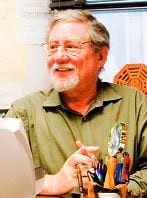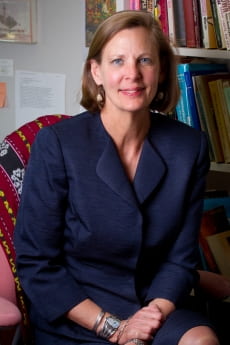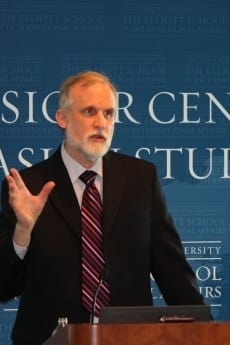Dr. Jonathan Chaves will serve as a panelist on China Institute’s memorial panel about Wang Wusheng and his art on September 22, 2018. The memorial panel is part of a one-day international symposium in New York titled Photography and China, which will be held in conjunction with the China Institute Gallery’s current exhibition Art of the Mountain: Through the Chinese Photographer’s Lens. Dr. Chaves will discuss Wang Wusheng’s work, and its place in world art.
Author: tanvi19
8/07/18: David Shambaugh Writes an Op-ed for South China Morning Post
The US gives more to Asean than China does. Asean just needs to know it
By: David Shambaugh
This excerpt is from an article originally published by the South China Morning Post, on August 7, 2018.
US Secretary of State Mike Pompeo’s recent diplomatic tour through Southeast Asia visiting Indonesia, Malaysia and Singapore – was a useful opportunity to begin resetting the regional narrative about America’s roles in the region. Unfortunately, Pompeo’s “parachute diplomacy” through three of the 10 Asean states is likely only to further fuel the entrenched perception of the United States as an episodic actor that has no real strategy for the important region.
Meanwhile, regional media and governments lavish attention on China – and most Asean states have drawn increasingly close to China over the past two years. The exceptions are Vietnam – which casts a wary eye towards its northern neighbour while still engaging it – and Malaysia since Prime Minister Mahathir Mohamad returned to office and began to freeze multiple Belt and Road Initiative projects. Yet, despite the review and likely renegotiations (which Mahathir will discuss with Chinese leaders in Beijing in mid-August), Malaysia is unlikely to alter its long-standing close relationship with China.
Despite the region-wide gravitation towards China, and the pervasive pro-Beijing regional narrative, the empirical reality is that the US offers the region more than does China. The US maintains a comprehensive and robust presence throughout Southeast Asia. But most Southeast Asian governments are reluctant to recognize or publicise the US presence or contributions to regional security, stability and growth.
The US presence has deep roots, dating back to the post-second world war period, which have grown dramatically since the 1980s, covering commerce, security, education and diplomacy, among other domains. America’s strengths lie in both hard and soft power, and the US economic footprint is both broad and deep.
8/02/18 Gregg Brazinsky Quoted in the Wall Street Journal
Dr. Gregg Braznsky was recently quoted in a Wall Street Journal article, “New Sign of Trump-Kim Warmth Comes Amid a Frosty Diplomatic Process,” by Michael R. Gordon, Michael C. Bender and Jonathan Cheng. In the article, Dr. Brazinsky commented on North Korea’s hesitance to trust the rapprochement process with the US. Dr. Brazinsky also highlighted the improbability of completely disarming North Korea in just two months.
8/06/18 – Janet Steele Talks About Islam and Journalism at the Singapore Press Club
Dr. Janet Steele, will hold a talk at the Singapore Press Club on August 6, 2018. Dr. Steele’s talk will focus on the practice of journalism in Malaysia and Indonesia through the lens of Islam. Recently, Dr. Steele published her book Mediating Islam: Cosmopolitan Journalisms in Muslim South-east Asia, which moves away from a western liberal approach to journalism, and looks at how Islamic values and principles influence journalism in Southeast Asian countries like Malaysia and Indonesia.
7/30/18: David Shambaugh Discusses Contemporary China with North Asia CAPE
Dr. David Shambaugh was recently named the inaugural North Asia CAPE fellow by the North Asia Centre of Asia-Pacific Excellence, a New Zealand based organization. During his recent visit to New Zealand, Dr. Shambaugh had the opportunity to discuss the complexities of contemporary China with North Asia CAPE.
Dr. Shambaugh addressed diverse topics including Chinese president Xi Jinping’s leadership, China’s socio-economic development, and China’s contribution to global governance.
To learn more about his observations, watch his interviews below!
Read about Dr. Shambaugh on North Asia CAPE’s official website.
7/19/18: Bruce Dickson Quoted in Financial Times Article
Dr. Bruce Dickson was quoted in the Financial Times article “The Chinese Communist party entangles big tech,’’ by Louise Lucas. Dr. Dickson talked about the Chinese Communist party and its relations with the private sector.
7/14/18: David Shambaugh Quoted in South China Morning Post Article
Dr. David Shambaugh gave his opinions on China’s Confucius Institutes in an article for the South China Morning Post. In the article titled “Confucius Institutes: China’s benign outreach or something more sinister?” Dr. Shambaugh was quoted as saying that he saw the institutes “as quite benign and devoted to their primary mission of teaching language and cultural studies.”
7/06/2018: Celeste Arrington Discusses US-North Korea Talks on Hearst TV
Dr. Celeste Arrington, the Korea Foundation Assistant Professor of Political Science and International Affairs, commented on Secretary of State Mike Pompeo’s recent trip to North Korea on an interview for Hearst TV. Dr. Arrington stressed that during the US – North Korea talks, both sides would have to come to an understanding on what denuclearization of the Korean peninsula means.
6/28/2018 Robert Sutter Quoted on US- China Competition in the South China Sea in USA Today Article
Dr. Robert Sutter was quoted in an article published in USA Today. The article titled ” High-stakes brinksmanship in the Pacific as China expands reach into the South China Sea” talked about China’s increasing presence in the South China Sea and its implications. Dr. Sutter’s comments in the article pertained to President Trump’s National Security Strategy and the US – China competition in the South China Sea.
6/23/2018: Christina Fink Publishes Article on “Myanmar: Religious Minorities and Constitutional Questions”
Dr. Christina Fink recently published her article on “Myanmar: Religious Minorities and Constitutional Questions” for Asian Affairs, vol. 49, issue 2, June 2018.
Abstract
This article examines the experience of religious minorities in Myanmar between 2011 and 2017 in the context of the 2008 constitution and a new system of governance. It highlights the precarity of religious minorities and argues that neither the constitution nor the state were reliable sources of protection or redress during this period. The first section considers the multiple identities of religious minorities with regard to citizenship and national belonging. The second section elucidates how an enabling environment for Buddhist nationalism emerged and what types of actions state and non-state actors have taken with regard to religious minorities. The final section addresses the 2008 constitution and rule of law in Myanmar in order to understand the challenges for religious minorities in securing justice and protection.








